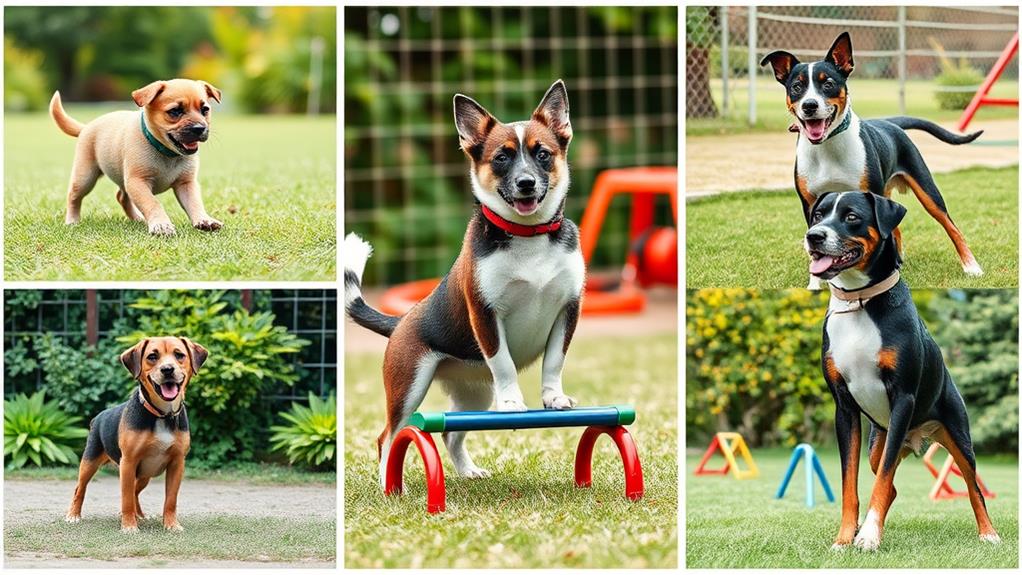Mastering dog training at every growth stage turns your pup into a well-behaved companion. Start with socializing your puppy by exposing them to different people and environments. As your dog ages into adolescence, be consistent with rules and exercise to channel their energy positively. For adults, reinforce basic commands while keeping their training engaging with advanced tricks. When caring for seniors, offer gentle exercise and simplified commands to build their confidence. Throughout, remain patient and address any socialization challenges effectively. There's so much more to uncover about this journey, and you'll want to know how to tackle each stage with confidence.
Puppy Socialization Techniques
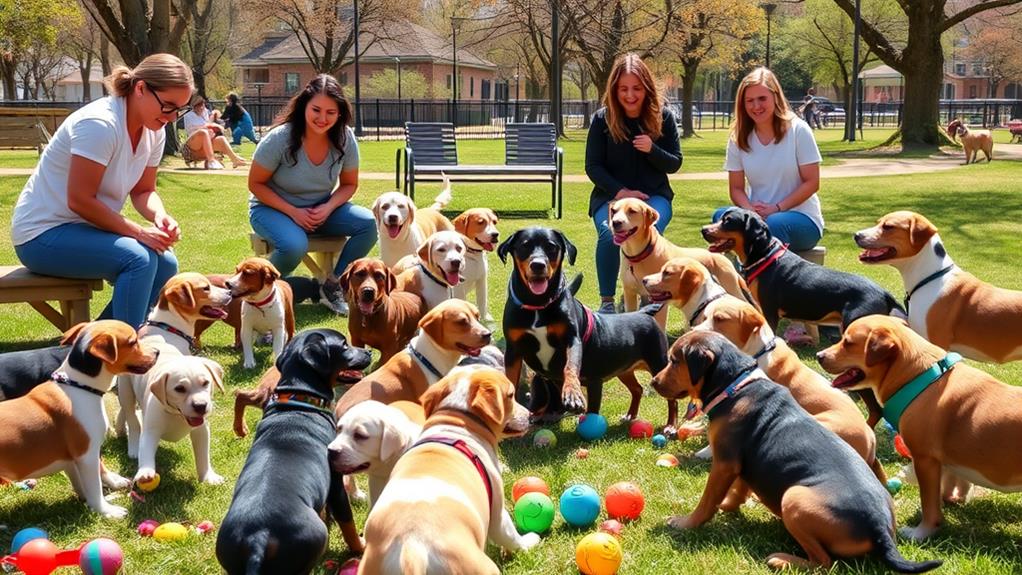
Socializing your puppy is essential to guaranteeing they grow into a well-adjusted adult dog. Start by exposing your puppy to various environments, sights, sounds, and people. Take them for walks in busy areas, visit parks, and introduce them to different surfaces like grass, concrete, and sand. Each experience helps build their confidence.
Next, arrange playdates with other vaccinated dogs. Supervised interactions allow your puppy to learn important social cues and how to behave around their peers. Confirm the other dogs are friendly and well-mannered to create positive experiences.
You can also enroll your puppy in a puppy kindergarten class. These classes provide structured socialization opportunities, helping your puppy learn basic commands while interacting with other dogs and people.
Don't forget about exposure to different types of people—children, seniors, and people wearing hats or glasses. The more varied the experiences, the better your puppy will adapt to new situations as they grow. Always reward them with treats and praise for calm behavior during socialization. By making these experiences positive, you'll help your puppy develop into a confident, well-socialized adult dog.
Adolescent Behavior Management
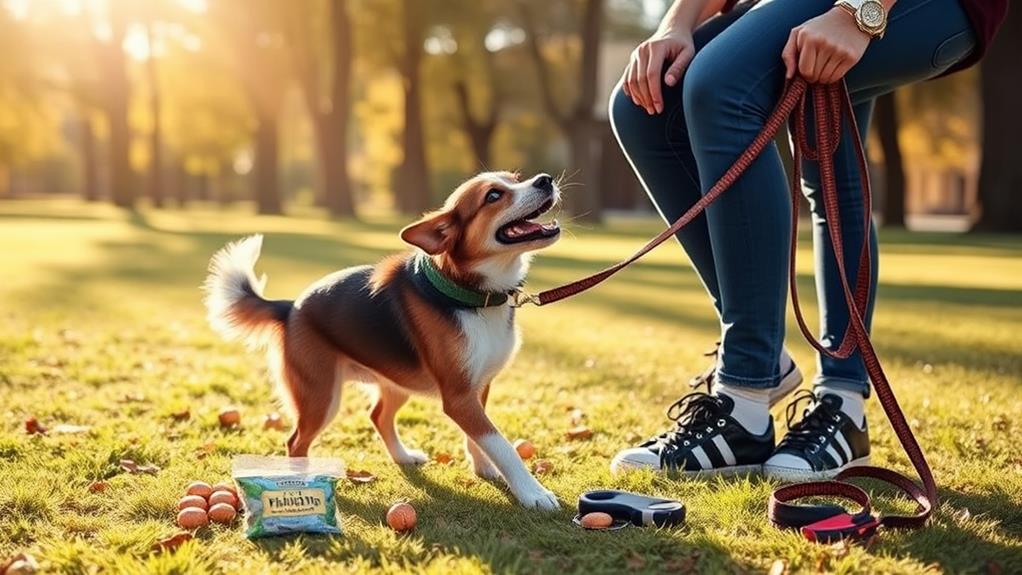
During the adolescent stage, many dogs experience a surge of energy and curiosity that can lead to challenging behaviors. You might notice your dog becoming more independent, testing boundaries, and occasionally ignoring your commands. It's indispensable to stay consistent and patient during this period.
Set clear rules and boundaries, and reinforce them with positive reinforcement. When your dog behaves well, reward them with treats, praise, or playtime. This encourages the right behavior and helps them understand what's expected.
Socialization remains pivotal; expose your dog to various people, environments, and other dogs. This helps reduce anxiety and aggression as they mature. Engaging in regular exercise is equally important, as it channels their energy into productive activities. Incorporate daily walks, play sessions, or even obedience training to keep their minds and bodies engaged.
If your dog exhibits undesirable behaviors like jumping or excessive barking, redirect their energy. Use toys or engage them in a new activity to shift their focus. Remember, this stage can be challenging, but with proper management and consistent training, you'll guide your dog toward becoming a well-mannered adult.
Adult Dog Training Strategies
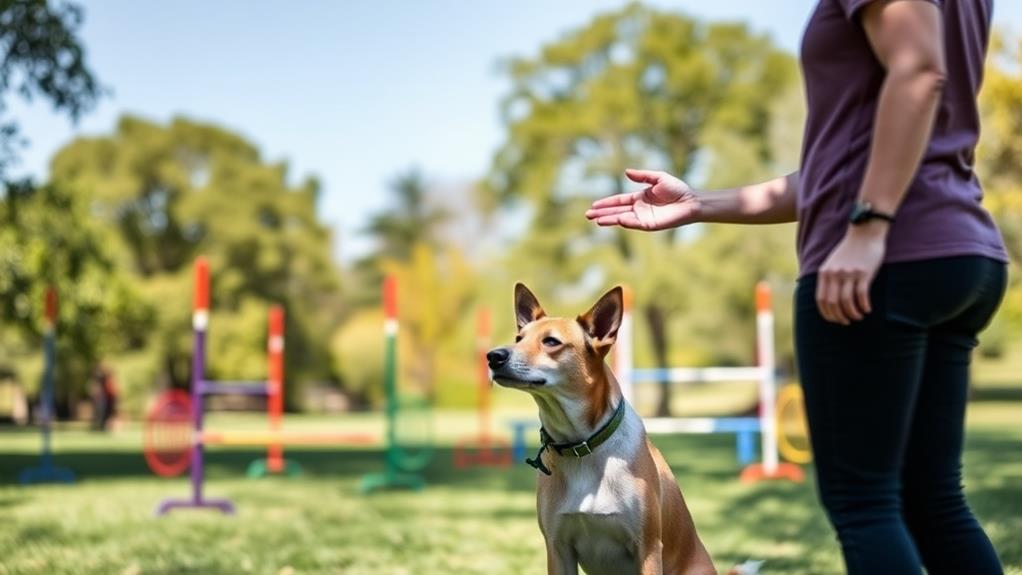
As your dog moves into adulthood, mastering effective training strategies becomes indispensable for reinforcing good behavior and maintaining a strong bond. Adult dogs often exhibit a more stable temperament, making this the perfect time to refine their skills and address any lingering issues.
Start by reinforcing basic commands like sit, stay, and come. Consistency is key; use the same cues and rewards each time. Incorporate more advanced tricks and commands to keep your dog engaged and mentally stimulated. Use positive reinforcement techniques, rewarding your dog with treats, praise, or playtime whenever they follow your commands.
Socialization remains paramount. Continue exposing your dog to new environments, people, and other animals. This helps prevent behavioral issues stemming from fear or anxiety.
Regular exercise is also essential. A well-exercised dog is less likely to develop unwanted behaviors, so incorporate daily walks, play sessions, or even agility training.
Senior Dog Considerations
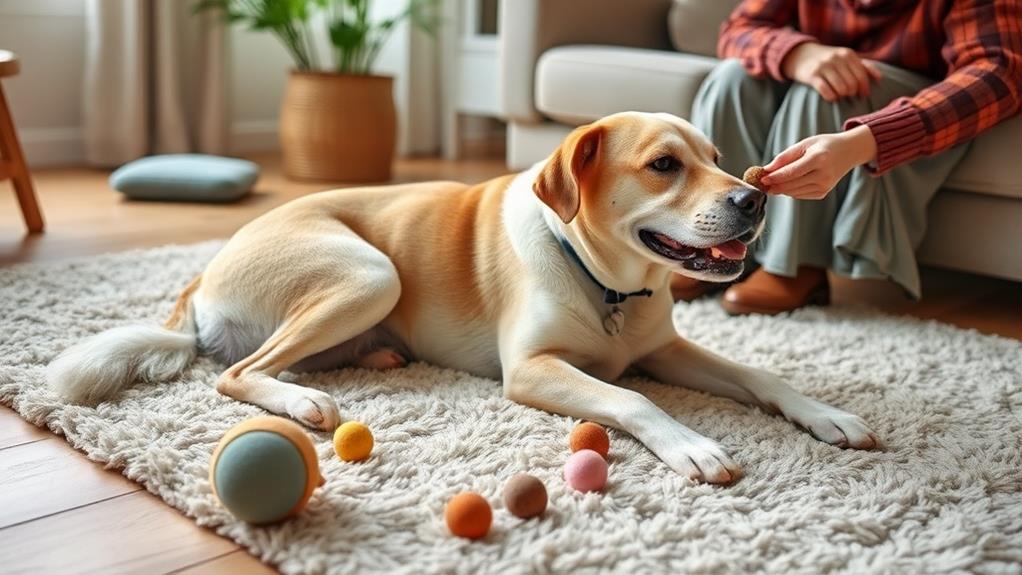
Caring for a senior dog requires understanding their unique needs and adjustments in training methods. As dogs age, they may face physical challenges like reduced mobility and sensory decline. It is crucial to adapt your training approach to accommodate these changes.
| Consideration | Adjustment | Benefit |
|---|---|---|
| Physical Activity | Shorter, gentler sessions | Reduced strain on joints |
| Commands | Simplify cues | Easier for them to understand |
| Training Environment | Quiet, familiar spaces | Less stress and distraction |
| Motivation | Use high-value treats | Increases engagement |
| Patience | Take it slow, repeat often | Builds confidence |
Focus on positive reinforcement and create a relaxed atmosphere during training. Remember, senior dogs may take longer to learn new commands or tricks, so patience is key. You should also consider their health and mobility when planning activities. Regular vet check-ups can help you monitor their well-being and adjust training as needed. By tailoring your training strategy to fit their specific needs, you'll enhance their quality of life and strengthen your bond.
Common Socialization Challenges
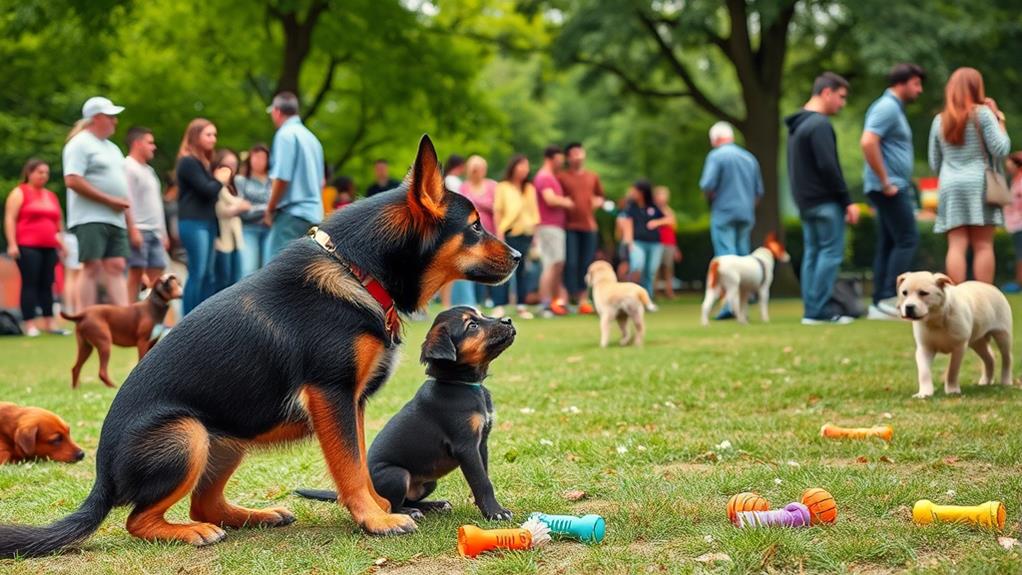
Socialization plays a pivotal role in a dog's development, but it often comes with challenges. Many owners struggle with getting their dogs comfortable around new people, other animals, and various environments.
One common issue is fearfulness, where your dog might react negatively to unfamiliar sights or sounds. If you notice your pup cowering or barking, it's of utmost importance to address this with patience and positive reinforcement.
Another challenge is overexcitement. Some dogs can become overly enthusiastic when meeting new friends, which might lead to jumping or barking. You'll want to teach your dog calm behaviors through consistent training and rewarding appropriate actions.
Additionally, some dogs may not have had adequate socialization during their critical growth periods, making it harder for them to adapt later in life. In such cases, gradual exposure to different scenarios can help, but it's absolutely essential to go at your dog's pace.
Frequently Asked Questions
How Do I Choose the Right Training Method for My Dog?
To choose the right training method for your dog, consider their personality, age, and learning style. Research various techniques, observe their reactions, and adapt your approach to guarantee a positive and effective training experience.
What Are the Signs of a Well-Trained Dog?
A well-trained dog listens attentively, responds promptly, and behaves consistently. It interacts politely, follows commands willingly, and remains calm in various situations. You'll notice these traits, showing your dog's training journey has been successful.
How Often Should I Train My Dog?
You should train your dog daily, even if it's just for short sessions. Consistency helps reinforce commands and strengthens your bond. Mix up activities to keep it fun and engaging for both of you.
What Supplies Do I Need for Effective Dog Training?
You'd think all you need is a leash and treats, right? But really, grab a clicker, training books, and patience. Consistent supplies make training easier, ensuring you both enjoy the process and each other's company.
Can I Train My Dog if I Have Limited Time?
Absolutely, you can train your dog with limited time! Focus on short, consistent sessions. Use positive reinforcement and practice daily. Even a few minutes can make a big difference in your dog's learning and behavior.
Conclusion
In mastering dog training, you'll see the joy of a well-socialized puppy contrasted with the challenges of an unruly adolescent. As your dog matures, adult training strategies will harness their energy, while senior considerations remind you to cherish every moment. Embrace the journey, where each stage offers its own rewards and hurdles. With patience and persistence, you'll transform challenges into triumphs, creating a strong bond that lasts a lifetime. Your dog's growth is your shared adventure!

